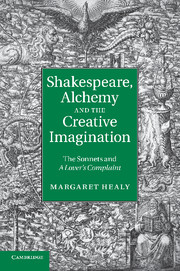Book contents
- Frontmatter
- Contents
- List of illustrations
- Acknowledgements
- A note on the texts
- Introduction
- 1 Alchemical contexts
- 2 Lovely boy
- 3 The dark mistress and the art of blackness
- 4 A Lovers Complaint by William Shake-speare
- 5 Inner looking, alchemy and the creative imagination
- 6 Conclusion: Shakespeare's poetics of love and religious toleration
- Notes
- Index
2 - Lovely boy
Published online by Cambridge University Press: 18 December 2013
- Frontmatter
- Contents
- List of illustrations
- Acknowledgements
- A note on the texts
- Introduction
- 1 Alchemical contexts
- 2 Lovely boy
- 3 The dark mistress and the art of blackness
- 4 A Lovers Complaint by William Shake-speare
- 5 Inner looking, alchemy and the creative imagination
- 6 Conclusion: Shakespeare's poetics of love and religious toleration
- Notes
- Index
Summary
PART I LOVE, MARRIAGE AND ALCHEMICAL PROCREATION
A year before Shake-speares Sonnets was published, a highly popular book of love emblems was launched into the European marketplace – Otto Vaenius's Amorum Emblematum (Antwerp, 1608). This magnificent trilingual edition testifies to a fashion for ‘erotic polyglottism’ that reached its apogee in the first decade of the seventeenth century. In his study of the emblem tradition, John Manning suggests that this and other works point to ‘a whole linguistic universe ruled by Love’ and characterized by ‘interconnectedness’ in the form of ‘visual and verbal puns and textures’. This was not restricted to emblem books: philosophical treatises, published letters, spiritual manuals, plays and poetry were among the texts participating in a web of cross-fertilizing conversations and tropes connected by love. To try to separate out sacred and profane love in this context – an exercise that modern commentators are prone to undertake – is a hazardous enterprise. George Herbert's wonderful poem ‘Love III’, in which Love-Christ is suggestively a prostitute while the poet-speaker is cast as a client, indicates that, in the first half of the seventeenth century, sex and the sacred could share the same poetic bed. Certainly, the rhetorical vogue for playing seriously (serio ludere) frequently involved manipulating love in many guises and it is this cultural-aesthetic environment that gave birth to the sonnets' most highly charged erotic creations – lovely boy and black beauty.
- Type
- Chapter
- Information
- Shakespeare, Alchemy and the Creative ImaginationThe Sonnets and A Lover's Complaint, pp. 57 - 97Publisher: Cambridge University PressPrint publication year: 2011



